Croatian Gin Takes to UK as Old Pilot's Enters British Market
December the 16th, 2021 - Croatian gin is extremely popular, and one of the most beloved of all is Old Pilot's, which has now taken to the largest island in all of Europe - the United Kingdom. The expansion of this Croatian gin to the demanding British market marks an important step forward for the brand.
As Poslovni Dnevnik/Sergej Novosel Vuckovic writes, the much loved Old Pilot’s Croatian gin, which is produced in Jankomir in Zagreb, has put its feet firmly on the ground of Great Britain, the northern European nation which is very well known for its love of a tipple (or ten).
The founders and owners of the distillery which makes this Croatian gin, Hrvoje Busic and Tomislav Anadolac, both participated in the Boisdale Live Music Restaurants & Bars Cigar Awards, which is the world's most prestigious meeting of cigar lovers outside of the borders of Cuba.
Their gin was served at the dinner, and the duo also presented the Cigar Communicator of the Year award. The distillers are unsurprisingly very happy to have their products placed on this demanding market, and in London they found themselves at the ''Chairman’s Club'' at the wildly famous Reform Club.
"By entering into a business relationship with a new strategic partner, a significant increase in sales is planned through positioning in the premium segment of spirits," said Anadolac. This year the business results for the creators of this Croatian gin are good (revenues, according to earlier data, could be up to six million kuna), and they also launched a new product - vodka, and are working on the third - whiskey.
“We're recording sales growth of more than 30 percent, and we're proud to be able to open up to another new market in England and enter the most exclusive Boisdale restaurants. Our vodka was launched back in November and so far the sales results are higher than expected and the feedback from the market has truly been excellent. The whiskey is still in the aging phase and will be ready for the market in about two years or so,'' pointed out Anadolac.
However, next year should also be fruitful for them, given that the company received about 1.4 million kuna from EU non-refundable funds (a total of 3.8 million) for the digital and green transition project.
They will also invest in new technology and an environmentally friendly boiler (one without CO2 emissions) and thus be able to realise some very ambitious plans, one of which is to become one of the ten best manufacturers in the entire world in this particular segment. The Minister of Economy and Sustainable Development, Tomislav Coric, also visited the Croatian gin plant yesterday, admitting that he was fascinated by what he saw at Jankomir.
“This successful entrepreneurial story starts from the moment when young people wanted to make a premium product and create the best giant of its kind in the world. It is really a great success to become number one in the world, especially with a product that has almost no tradition in Croatia. This success should serve as an inspiration to all future entrepreneurs,'' said the Minister.
"We plan to use EU funds to increase our production capacity, from the current 30,000 bottles per year to 500,000 over the next five years. We want to enter new markets and strengthen our position in existing markets. Of course, there are also new products involved in this story, but we'll talk about that when the time comes,'' Anadolac said.
It is known that he and Busic were trained as pilots at the Military Academy in Zadar, and realising that they share a passion for spirits, they founded a company with a distillery with a related name.
For more, check out Made in Croatia.
Croatian Children Older Than 5 Can Now be Vaccinated in Zagreb
December the 16th, 2021 - Croatian children over the age of five can now be vaccinated against the novel coronavirus, SARS-CoV-2, in the City of Zagreb. Here is how and where.
As Poslovni Dnevnik writes, competent school doctors will be responsible for vaccinating Croatian children up to the age of twelve, and their parents will also be able to refer their children for vaccination against coronavirus via the Terminko application (app). Preschool children will be vaccinated by selected doctors (pediatricians or GPs/family physicians).
The Croatian Institute of Public Health especially recommends that Croatian children belonging to vulnerable groups, such as those who suffer from chronic illness, are immunocompromised or live with a person categorised as the above be vaccinated.
From now on, all interested parents will be able to vaccinate their children over the age of five against the virus. Parents of children up to the age of 12 can be referred to be vaccinated by their parents via the aforementioned Terminko application, after which they will be vaccinated by a doctor at the school medicine clinic in charge of the school the child attends.
Parents who want to vaccinate their preschool children can now do so by contacting their chosen pediatrician or family medicine doctor. Children between the ages of 12 and 18 can, as before, be vaccinated at any of the mass vaccination points located in the City of Zagreb.
In accordance with the recommendations of the Croatian Institute of Public Health, the vaccination of Croatian children and other young people who have an increased risk of developing a more severe clinical picture should they contract the virus due to chronic illness or some form of therapy which might weaken their immune system is especially recommended.
Vaccination is recommended for both children and young people who share a household with people with chronic diseases, as mentioned, as such people have a much higher risk of developing more severe forms of the disease. Vaccination against coronavirus is also recommended for children who spend longer periods of time in various forms of collective accommodation, which includes overnight stays.
The detailed work schedule of the teams of the School and Adolescent Medicine Service in Zagreb can be found here.
For all additional questions, parents can contact the competent school doctor by e-mail according to the above schedule of school and adolescent medicine clinics of the Andrija Stampar Institute.
For all you need to know about coronavirus specific to Croatia, make sure to bookmark our dedicated section and select your preferred language if it isn't English.
Croatian Degordian Agency Opens New York Office, Plans US Expansion
December the 16th, 2021 - The Croatian Degordian agency is well known across the country for its success, and now they're eyeing expansion across the pond following their opening of another New York office.
As Poslovni Dnevnik/Lucija Spiljak writes, back in September this year, David Ackermann, the CEO of Croatian Degordian agency for digital marketing and production announced the possibility of opening new offices in international markets where their revenues grew by 180 percent and from where they're getting more projects than ever. Some of these offices are close to home in the rest of Europe such as in the UK and Austria, but the USA has also been on their map. Their announcement came true and they have now opened their fourth office in New York.
Expansion to international markets
The Croatian Degordian agency started out twelve years ago with their first office here in the City of Zagreb. Mostar in neighbouring Bosnia and Herzegovina then soon followed, and then the Serbian capital of Belgrade was next, which "cemented" their very strong regional position, but now, they say, they are targeting the demanding American market.
Over in New York, they plan to build a customer base, expanding to the rest of the US, and produce all of their solutions offered right here in the Adriatic region. The Croatian Degordian agency also pointed out that their desire is to provide a top team of experts across the Atlantic who are confident that they can build and implement the highest quality and most complex global projects.
Their New York office will be headed by Swany Velazquez, and the idea is to create a zero point, ie a starting point for the American market. Their New York business development team will focus on developing partnerships, sales networks, networking, and client network development.
Although New York is known as the world's most advanced market with absolutely enormous needs, Degordian believes that there are only a dozen large and serious agencies there, while others are smaller, have too few people, a very narrow range of services, and often insufficient experience and knowledge. It's natural that they're seeing opportunity in the Big Apple.
The Croatian Degordian agency has won the “Best Employer” award six times and they claim to have better access to talent, an extremely qualified and capable team, but also a stronger set of services. The head of the New York office and executive director for the North American market, Swany Velazquez, sees huge potential in Degordian and says she has been following it for several years now.
“I've always been fascinated by Degordian's culture, talent, team and quality. I’ve been present in the US market for years now, but I don’t know when I last saw something like this. I think Degordian has huge potential both in NYC and globally. I'm really looking forward to new beginnings. We want to repeat what was done in Croatia in NYC,'' said Velazquez of the move.
For more, check out Made in Croatia.
Large Fines Introduced for Refusing to Present Covid Certificates in Croatian Public Institutions
December 16, 2021 - On Wednesday, December 15, 2021, the Croatian Parliament amended the Law on Protecting the Population from Infectious Diseases. It introduced 30 to 50 thousand kuna fines for refusing to present Covid certificates in Croatian public institutions.
On the same day, the Croatian Civil Protection Headquarters made seven new decisions valid from December 16 to 31 this year, when they will be considered again. The Headquarters extended the Decision on introducing a special security measure in the social welfare sector, reports Koronavirus.hr.
The decision implies “mandatory testing of all employees for the SARS-CoV-2 virus in social welfare, i.e., in social welfare institutions, associations, religious communities, other legal entities, craftspeople and natural persons who perform social care as a professional activity and the Center for Special Custody, who come to work at least twice in seven days. Exceptionally, testing is not mandatory for employees who "qualify for vaccination or recovery from COVID-19 unless they have signs of respiratory infection, other symptoms, or signs of COVID-19."
Recall, from mid-November this year, Covid certificates are mandatory for all employees of public and state services and users of their services.
The same decision applies to all parties who come there, all service providers who provide services in those premises, or other persons who come there on any grounds. Those who refuse to present a certificate cannot enter the premises.
The EU digital Covid certificate system has been developed at the European Union level, with 42 countries participating.
Issuing certificates
The easiest way to get you Covid confirmation is through the e-Citizens platform. However, some citizens who do not use e-Citizens can physically obtain a certificate. Certificates can also be obtained from pharmacies.
All test sites can issue a certificate, HZZO counters do the same, and family medicine practices, pediatric and dental practices.
Each test and vaccination is immediately recorded in the system. Any change in the status of the vaccinated person requires the person to obtain a new Covid certificate.
The third vaccine dose does not mean that the Covid certificate is automatically extended. These people need a new certificate because an extra dose does not mean an automatic extension. The new permit will be valid for one year from the date of vaccination.
Covid certificate control
Controlling certificates is done with the help of the covidGo mobile application, and it is available to everyone for free. Furthermore, the application does not require internet and works offline.
The public key list is updated once a week. The control itself does not require costs; it can be easily done with free tools.
When certificates in public institutions do not apply
Certificates do not apply to students, pupils, persons under the age of 16, persons who bring a child or pupil to school in kindergarten, persons who accompany a person who cannot take care of themselves, persons who come to the HZZO area to pick up their Covid certificate, to users of postal services who have to pick up shipments whose non-acceptance would have legal consequences and to persons who have a contraindication to the vaccine.
A doctor's certificate can also be used to come to work, which is issued based on a rapid antigen test to confirm that the person has recovered from the virus for the past 12 months. Also, those who had the infection within 12 months and proved it by PCR test must show medical documentation.
The testing obligation does not apply to public transport. The headquarters extended the decisions related to the operation of shops, public transportation, the decision on masks, and on crossing the border.
People who go to trial do not have to have a Covid certificate, but they must adhere to all other epidemiological measures.
Members of the Croatian Civil Protection Headquarters invited other private employers (who do not participate in social welfare) to introduce the mandatory Covid certificate measure because it is not compulsory for them but in the form of a recommendation.
Assembly decision modified
On Wednesday (December 15, 2021), the Headquarters amended the Decision on Restricting Assemblies, i.e., introduced the permission that more than 100 people can attend a public event or assembly, if approved by the County Public Health Institute in whose area the assembly is held.
Due to the new strain of the virus, the Headquarters extended the temporary ban on entry into Croatia of persons coming from South Africa, Botswana, the Kingdom of Eswatini, Lesotho, Namibia, Zimbabwe, and the Republic of Mozambique, or who have stayed in those countries for the past 14 days. The amended decision allowed persons from Hong Kong to re-enter.
Exceptionally, citizens of the Republic of Croatia (RH) and members of their families who are long-term residents, who have the right to reside under other EU directives or national law in the Republic of Croatia or who have long-term national visas for the Republic of Croatia are exempted from the decision. However, they are subject to a mandatory quarantine of 14 days upon entry and compulsory testing on the last day of quarantine.
Until the end of the year, the current measures concerning border crossings, public transport, the mandatory use of face masks, and organizing the work of shops will be extended.
For all you need to know about coronavirus specific to Croatia, make sure to bookmark our dedicated section and select your preferred language if it isn't English.
Angels Exhibition by Split Photographer Ivo Pervan Announced at Sinj's Sikirica Gallery
December 16, 2021 - In the sweet anticipation of Christmas, Sinj's Sikirica Gallery is preparing an exceptional exhibition of photographs: Angels by Split photographer Ivo Pervan.
This Advent in Sinj, visitors will enjoy the beautiful light of these supernatural beings.
According to the photographer: "Photography is the universal language of our planet."
Pervan's angels will truly speak to visitors in the angelic language of divine messengers, and in this pre-holiday time, bring the much-desired peace that will be easily carried from heaven by their light wings.
The sculptures and images of angels shown in these photographs are done in different materials and techniques and from different stylistic periods. We will see depictions of angels from Croatian and European cathedrals, the famous Chagall angel, the angel of the Croatian painter Ivan Ranger and the oldest from the church of St. Sophia from the time before the church schism.
The Angels exhibition was organized by the association Prokultura from Split, the Sinj Tourist Board, and the City of Sinj, in cooperation with KUS and the Sikirica Gallery. The opening is on December 17 at 6 pm, and you can visit it until January 31, 2022. Musicians Mislav Norac and Mirna Alfirević will complete the evening with their magical musical notes.
Ivo Pervan was born in 1947 in Split. He started working in photography in high school, and after graduation, he continued to work as a freelance photographer. Since the 1990s, he has been cooperating with travel agencies and communities, and thanks to his exceptional talent, he has brought Croatia a number of international awards for posters with his photographs. He works tirelessly to preserve and promote Croatian cultural heritage and history.
The exhibition will take place in accordance with the recommendations of the Civil Protection Headquarters and the applicable measures of the CNIPH.
To read more about Inland Dalmatia, follow TCN's dedicated page.
Sinj Christmas Fairy Tale Presented at Cetina Region Museum Tonight!
December 16, 2021 - As part of the ‘2021 Sinj Advent’ event, the Cetina Region Museum and the Sinj Tourist Board invites you to enjoy the Sinj Christmas fairy tale Liskan on a Christmas Adventure.
The presentation will take place on Thursday, December 16, starting at 6:30 pm at the Cetina Region Museum in Sinj.
With the address of the authors, curator of the Cetina Region Museum in Sinj, Daria Domazet and Anđela Vrca, and fairy tale illustrator Petar Radović, the fairy tale will be presented by Croatian poet, essayist, linguist, and literary critic Siniša Vuković.
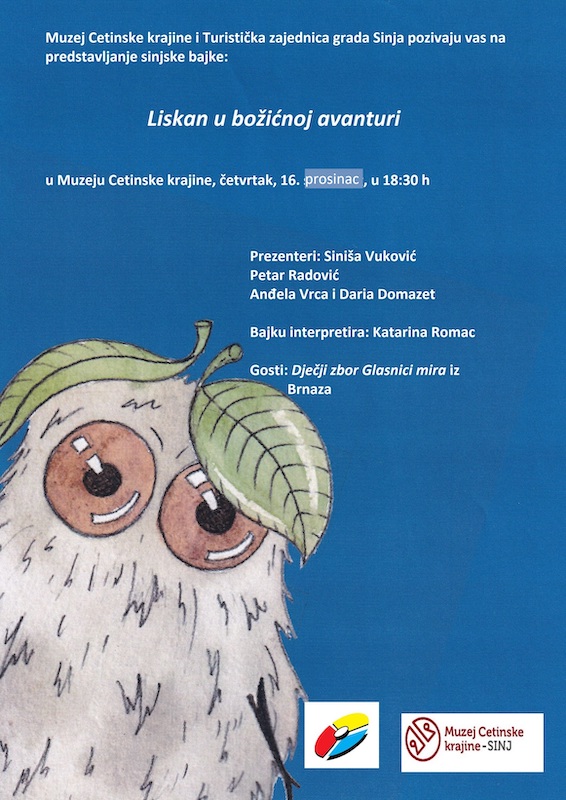
All visitors will have the opportunity to enjoy the fairy tale interpreted by Croatian National Theater Split actress from Sinj, Katarina Romac.
The children's choir Glasnici Mira from Brnaz will enrich the program by performing.
The program will be held in accordance with all epidemiological measures.
To read more about Inland Dalmatia, follow TCN's dedicated page.
Sonus Festival Unveils Second Round of Acts for 2022 Edition on Pag
December 16, 2021 - The clock is ticking for the much-anticipated return of Croatia's revered underground Sonus Festival.
Black Coffee, Carl Cox, Deborah de Luca, Denis Sulta, FJAAK DJ, and William Djoko plus many more have been added to the line up which already counted more than 40 international headliners. It all goes down across three celebrated open-air clubs on Zrce Beach from August 21 - 25, 2022.
Because of the ongoing uncertainty around the Coronavirus pandemic, Sonus wants to put customers at ease. As such, if you book with Sonus you are safe: even if the event gets cancelled the festival will refund tickets. There is also the option to do booking protection when you book your tickets so you can even get money back in case you fall ill. Also, there are payment plans available.
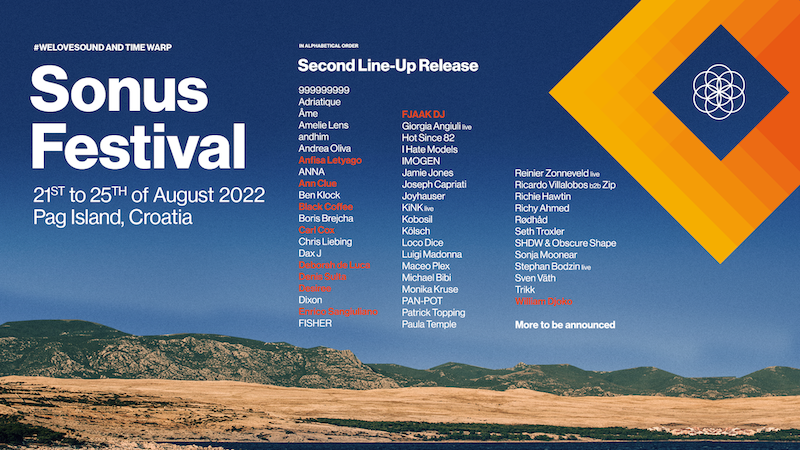
A lot more flights are set to be added to Croatia from all over Europe in the first part of 2022 so getting there will be easier than ever. Booking your accommodation through Sonus Festival and the official partner Festicket is the only way to guarantee that you won’t lose out in the event of an unforeseen cancellation.
Of course, once you arrive, you will bask in the natural beauty of the region with its stunning sweeping beaches, glistening ocean, and three world-famous coastal clubs Aquarius, Kalypso, and Papaya all providing the locations. The music will play non-stop from dusk till dawn for five days and nights. There are also plenty of quiet spots and secluded bays to explore as well as a wealth of sun loungers and meandering coastal walks to enjoy.
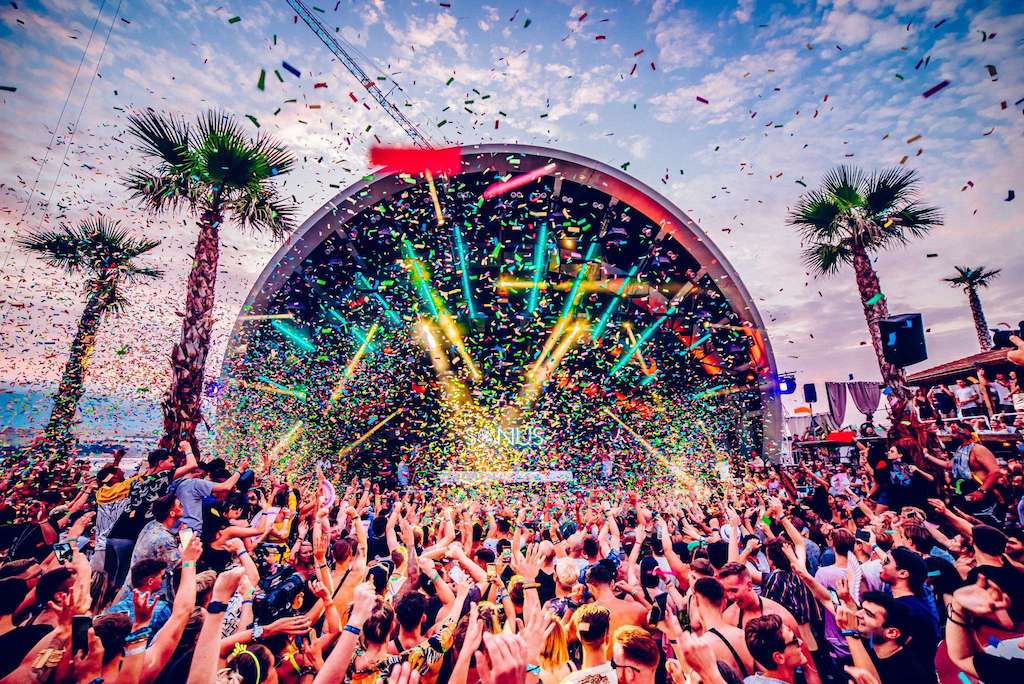
Chief amongst the newly added names are South African house kingpin Black Coffee, plus the enduring UK techno icon that is Carl Cox, Italian selector Deborah de Luca, the always party-starting Scot Denis Sulta, a DJ set from the raw and rugged FJAAK DJ, and William Djoko and classy techno from Enrico Sangiuliano, Anfisa Letyago, Ann Clue and Desiree amongst much more.
These latest names come on top of the likes of Ricardo Villalobos b2b Zip, KiNK (live), FISHER, Paula Temple, Amelie Lens, Reinier Zonneveld live, Sven Väth, Boris Brejcha, Rødhåd, Richie Hawtin, Dixon, and tens more, which makes Sonus 2022 the most mouthwatering edition yet.
Tickets, Accommodation & Information:
LINE UP ADDITIONS
Anfisa Letyago
Ann Clue
Black Coffee
Carl Cox
Deborah de Luca
Denis Sulta
Desiree
Enrico Sangiuliano
FJAAK DJ
William Djoko
FIRST WAVE NAMES
999999999
Adriatique
Âme
Amelie Lens
andhim
Andrea Oliva
ANNA
Ben Klock
Boris Brejcha
Chris Liebing
Dax J
Dixon
FISHER
Giorgia Angiuli live
Hot Since 82
I Hate Models
IMOGEN
Jamie Jones
Joseph Capriati
Joyhauser
KiNK live
Kobosil
Kölsch
Loco Dice
Luigi Madonna
Maceo Plex
Michael Bibi
Monika Kruse
PAN-POT
Patrick Topping
Paula Temple
Reinier Zonneveld live
Ricardo Villalobos b2b Zip
Richie Hawtin
Richy Ahmed
Rødhåd
Seth Troxler
SHDW & Obscure Shape
Sonja Moonear
Stephan Bodzin live
Sven Väth
Trikk
For more on lifestyle in Croatia, follow TCN's dedicated page.
Split Winter Tourism Roundtable Meeting Minutes & Action Plan
December 16, 2021 - The first Split Winter Tourism Roundtable took place at CHOPS Grill in Split on Monday - a transparent publication of the meeting minutes and action plan.
I had no idea what to expect from the TCN Split Winter Tourism Roundtable initiative, but I certainly did not expect it to be as productive as it was on Monday, or to have so much engagement from everyone present and a collective willingness to try and move things to the next stage.
I will be publishing my own reflections on morning (and afternoon) of high energy, positive vibes, and an excellent extended lunch by CHOPS Grill, our very generous hosts for the roundtable. But for now, as promised, the minutes from the meeting and proposed action plan to get to the next stage.
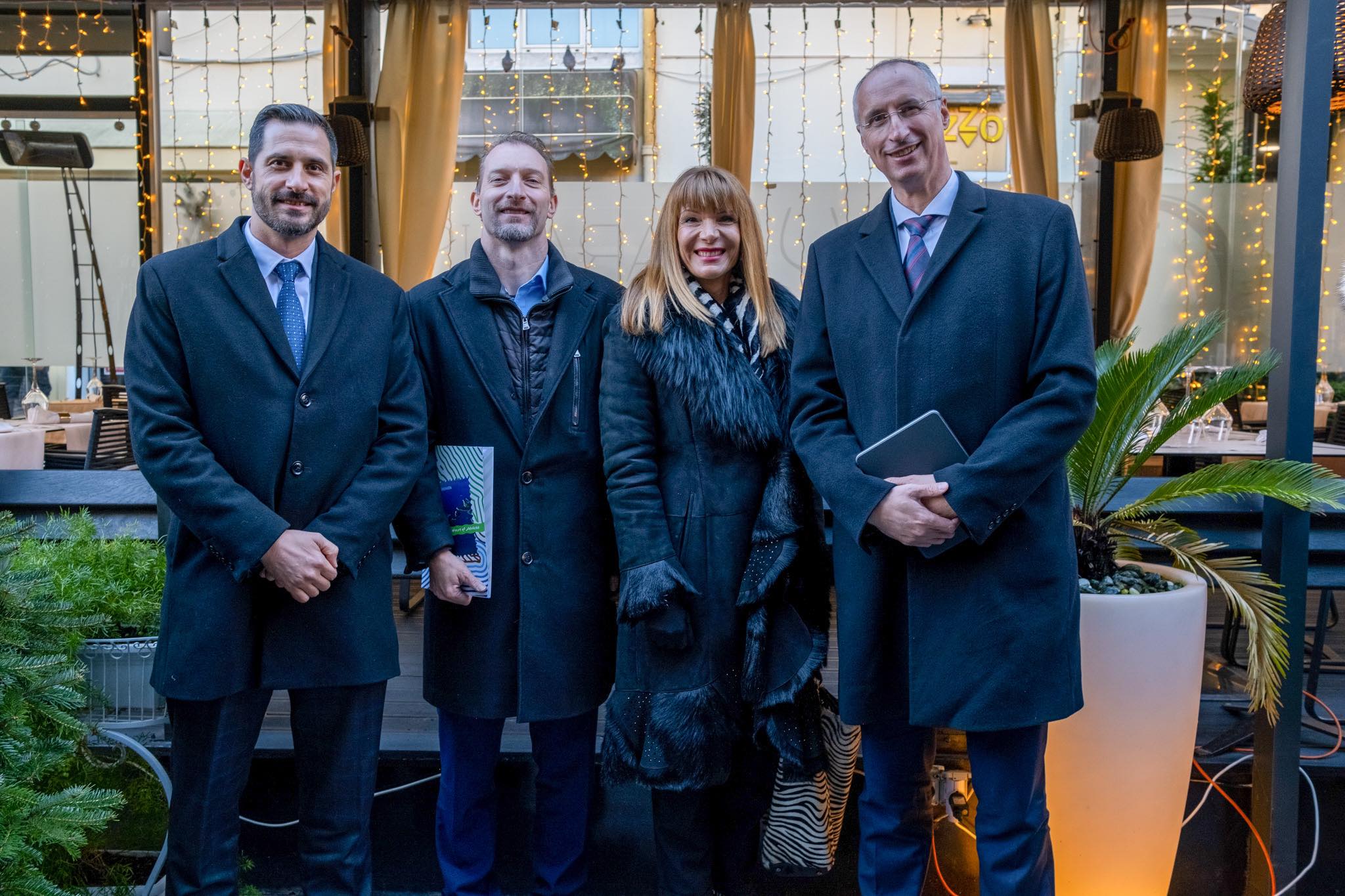
Date: December 13, 2021
Host: Jasmina Krušić and Chops Grill Steak & Seafood
Organisers: Total Croatia News (CEO Paul Bradbury & COO Daniela Rogulj), Maria Mustapić (Brasserie on 7, Zinfandel Food & Wine Bar, Charlies Bar, Split hostels), Jelena Tabak (Dujkin Dvor, Split Association of Caterers), Jasmina Krušić (Chops Grill Steak & Seafood)
Moderator: Michael Freer
Attended by: Ivica Puljak, Mayor of Split, Tonči Glavina, State Secretary of the Ministry of Tourism, Alijana Vukšić, Director of Split Tourist Board, Joško Stella, Director of Split-Dalmatia County Tourist Board, Pero Bilas, Deputy Director of Split Airport, Joze Tomaš, President Split-Dalmatia County Chamber of Economy, Nataša Bušić, Secretary of the County Chamber for Tourism, Paul Bradbury, journalist and CEO of Total Croatia News, representatives of hotels (Nevena Antonini - Radisson Blu Split, Arnoud Zaalberg and Andrijana Mladina (Le Meridien Lav), Zoran Pejović (Paradox Hospitality), Marija Mustapić (Split hostels), Jelena Tabak (Split Association of Caterers), Ante Lacman (Intours MICE), Ivana Durdov (Secret Dalmatia), Chops Grill owner and host Jasmina Kruščić, and TCN minute taker Daniela Rogulj.
*The meeting was attended by a mix of the private, public, and charity sectors.
How can we improve everyone’s life in Split? Dalmatia? Croatia?
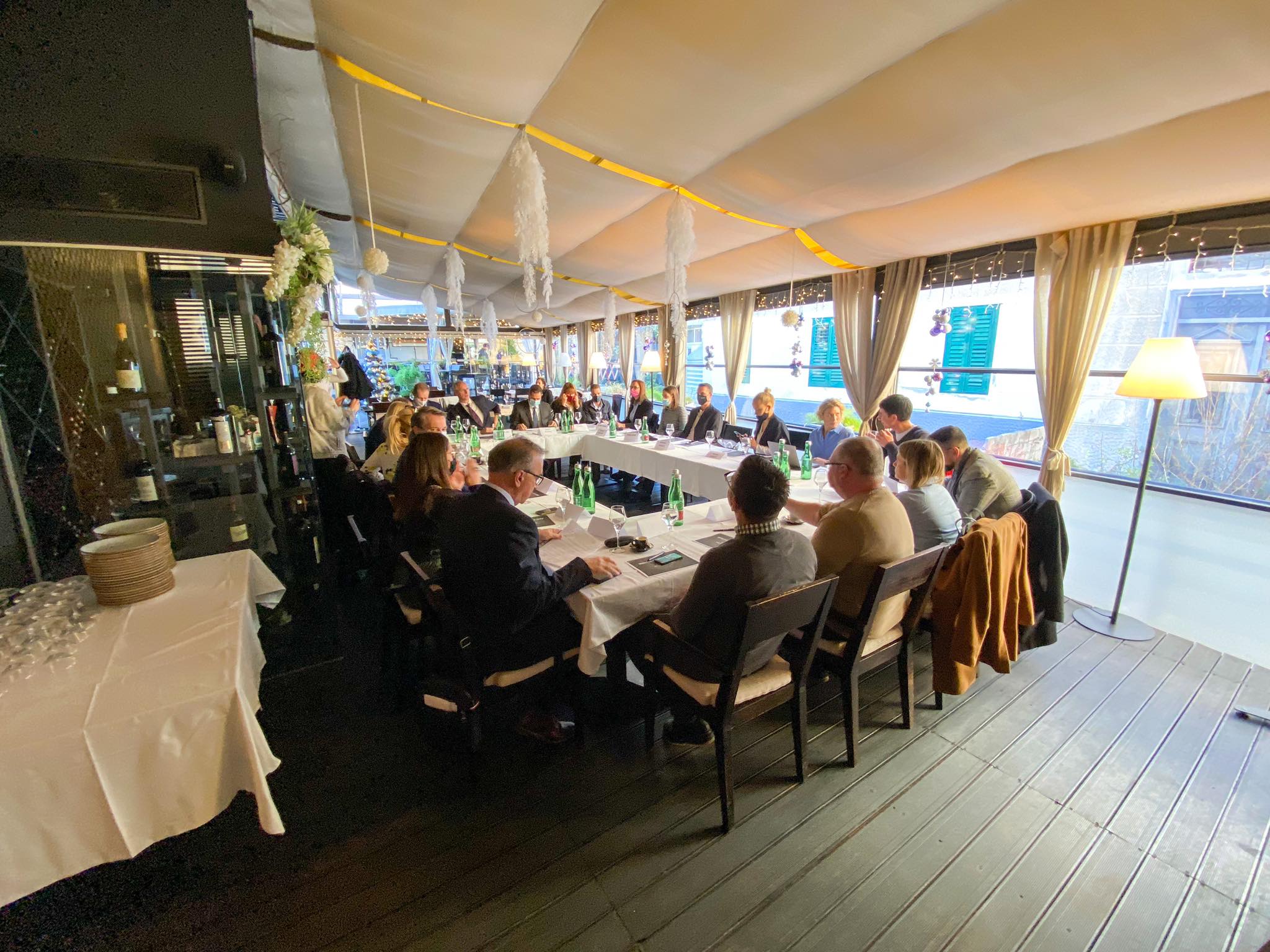
Split Winter Tourism Roundtable Goal: To come up with ways forward; get everyone on the same page; give our own opinions and ideas.
Icebreaker
What does Split already have for tourists in November? | What is Split missing in November?
What do we have?
Good weather
Comments:
*Bura in November - yearly statistical averages show that Split has the worst weather in the Mediterranean in terms of rainy days. Compared with other Mediterranean cities, this could raise an issue for Split as a city break destination.
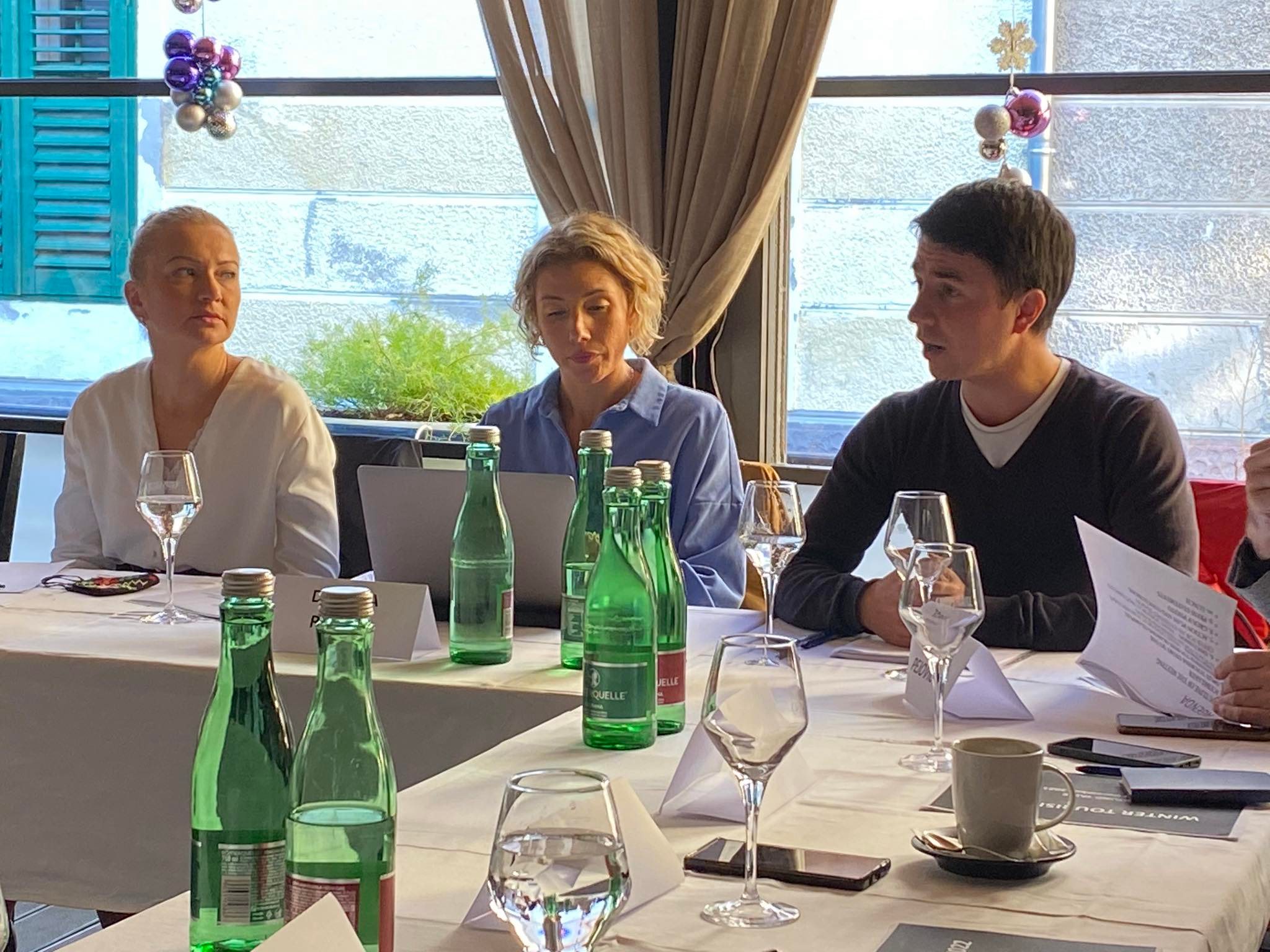
Active tourism
Comments:
*Olive picking, bike tours, hiking.
*HGK has 10 tourism clusters, from active tourism to hotels. Congresses are held to bring together people who offer active tourism and accommodations, with activities for ages 7-77.
*HGK also has a cultural association and a diving association, all to extend the season and look past the sun and sea.
*Winter sailing potential - totally different experience.
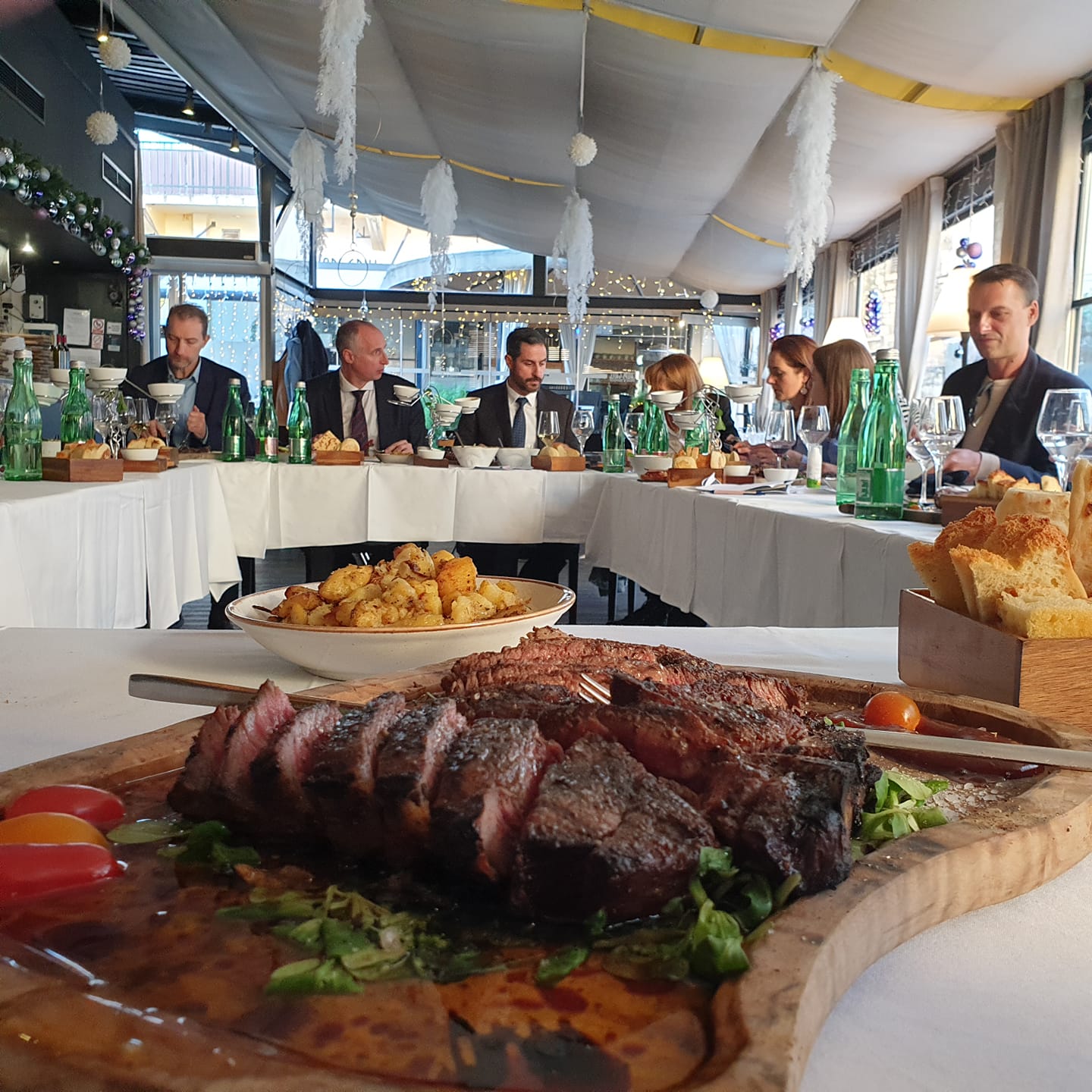
Gastronomy
Comments:
*Jelena Tabak of the Split Caterers Association spoke about how the Split offer has changed in the last 5 years to become a culinary centre of Croatia, with a better offer than Zagreb. Restaurants are the last part of the land-service offer chain. Gastronomy is very important and caterers are struggling to get locals back in town (they are going to shopping malls instead). Caterers trying to create a local offer, because without locals, there are no tourists.
*Gastro festivals in November won’t be possible if terrace prices increase in town. Caterers are waiting for a new strategy, otherwise restaurants will be forced to operate seasonally (it would be the responsible thing for restaurants to do). Caterers need to know the strategy (if terrace price increase, it will destroy the fight they have won so far)
*November is wine month - keep in mind for future events.
*Arnoud Zaalberg has been in Split for 11 years. The restaurant offer has changed from catering to the masses to adapting to new flavours.
*Need to work on sustainability - see what is around us in Dalmatia, what we have/have lost over the years. People don’t want to work in fields as they aren’t supported. Restaurants need to work with local OPGs, as there are many great things around Dalmatia to help the culinary tourist offer.
*Istria is doing a much better job than Split, but the restaurant sector is going in the right direction.
*Zoran Pejović added that gastronomy is not where it should be. While it is better than it was, and miles have been crossed, there is a difference in what you can get and how people perceive Split gastronomy abroad.
*Split is not a gastronomic destination - internationally people don't know what Split has. Split needs to find a new narrative/storyline to make the city distinct.
*Slovenia is doing an amazing job thanks to one female chef - Ana Roš - who is single-handedly putting Slovenia on the world map. Croatia needs to find their Ana.
*Split needs to create responsible activities. Our wine and olive oil are on par with the rest of the world, but there is no good package, no good narrative. We need to find ambassadors.
Split vs. Dubrovnik | Car Launches
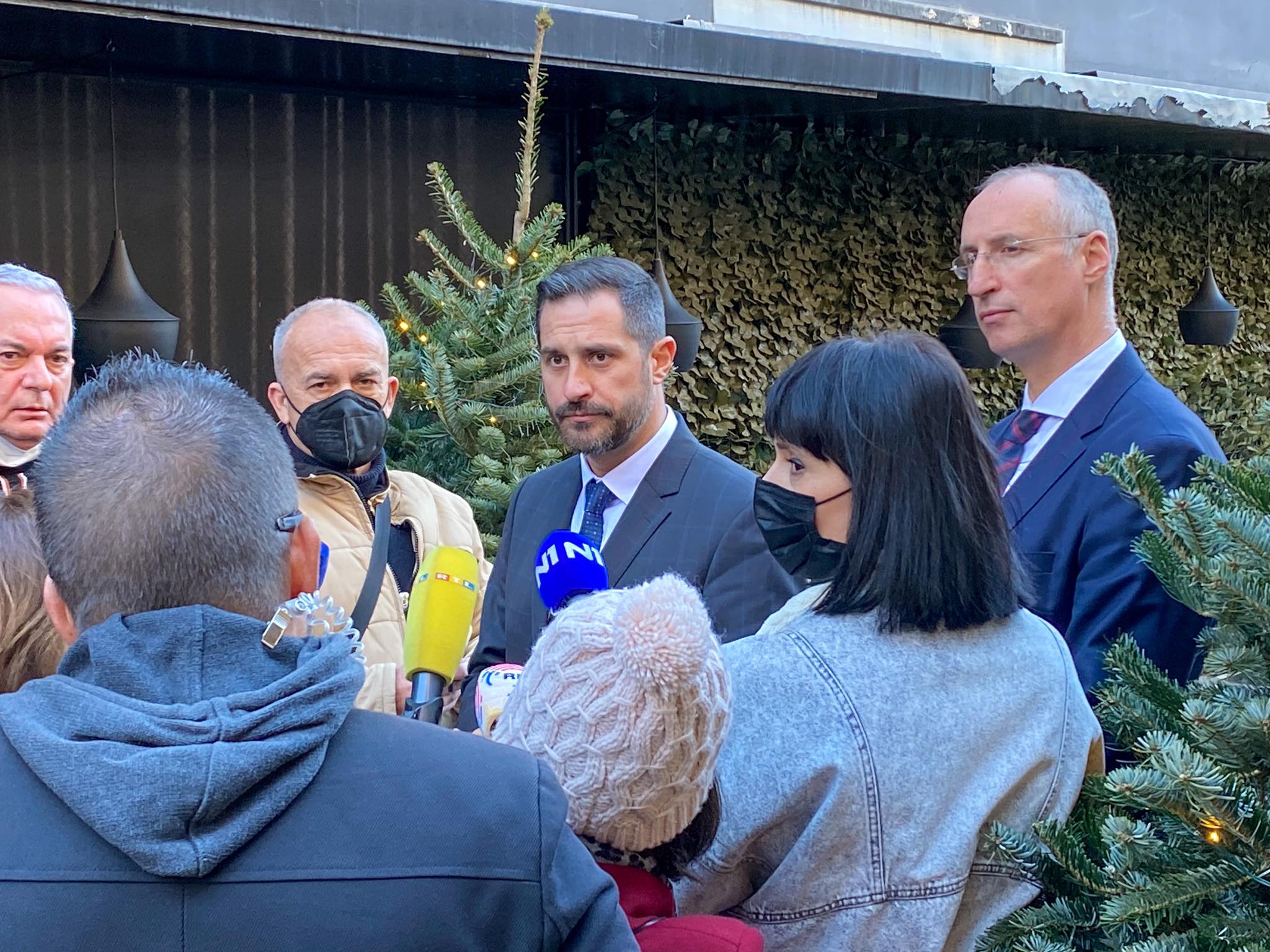
Comments:
*Split needs to develop a long-term plan so we don’t turn into Dubrovnik.
*Andrijana Mladina believes Split needs to be more attractive with a lot more elements.
*The season in Dubrovnik is longer than in Split as they have a filming industry, car launches, hotels, and DMCs.
*Ante Lacman believes Split needs to be more flexible; be a partner instead of an enemy.
*Intours is the regional leader in the MICE segment. There is an interest in car launches focused on the pre and post-season, but the issue is connectivity.
*100 requests for car launch events - people are bored of the usual locations - Split could receive at least 1 million euro - they are always held in the offseason - big car names - but they fail due to the flight connections.
Accommodation
*Arnoud added that Split is missing 2-3k beds year-round. Split cannot compete with Malta in this segment - need 5-6 bigger hotels with 250 - 300 keys - and a convention centre to extend the season.
*Split has no real international hotels - why is everything opening in Montenegro? Because foreign investment is too difficult here.
*Zoran - Do we have empty beds? Yes. Do we have hotels? No. Hotels in Montenegro are there for both good and bad reasons. Split lacks hotels that will further the image of the destination. No hotels in Dubrovnik have helped to further international image - and Split is millennia behind.
*Split needs hotels that will help position the city on the market / add convention centers. 6-8 room hotels do not help the image of the destination.
*Andrijana believes Dubrovnik tourism was lucky with misfortune. Split took a long time to become ‘a destination’. Le Meridien helped make Split a destination.
Is there a city break offer?
*If we have flights, we need experiences - hiking and kayaking are questionable due to weather. The Palace has potential for events in the basement (or indoor events)
*November offer needs to be much better for people to visit, but we need to focus on the region first.
*Split is the only big city where the population is declining - no local life to give to travellers - empty old town - need events.
*Only bars and restaurants in the centre - we need to be a reason to get people into the centre- during the week there is nothing to do.
*Shopping is awful - no big or designer brands.
*Need to focus on the local market - ned to attract locals to Split in November.
*City break - 4 day work weeks? Need content for a 3-day weekends.
*Exhibitions
*4 UNESCO protected sites - big on the cultural map - small galleries - really talented people - private initiatives alongside with UNESCO - not explored enough in the offer
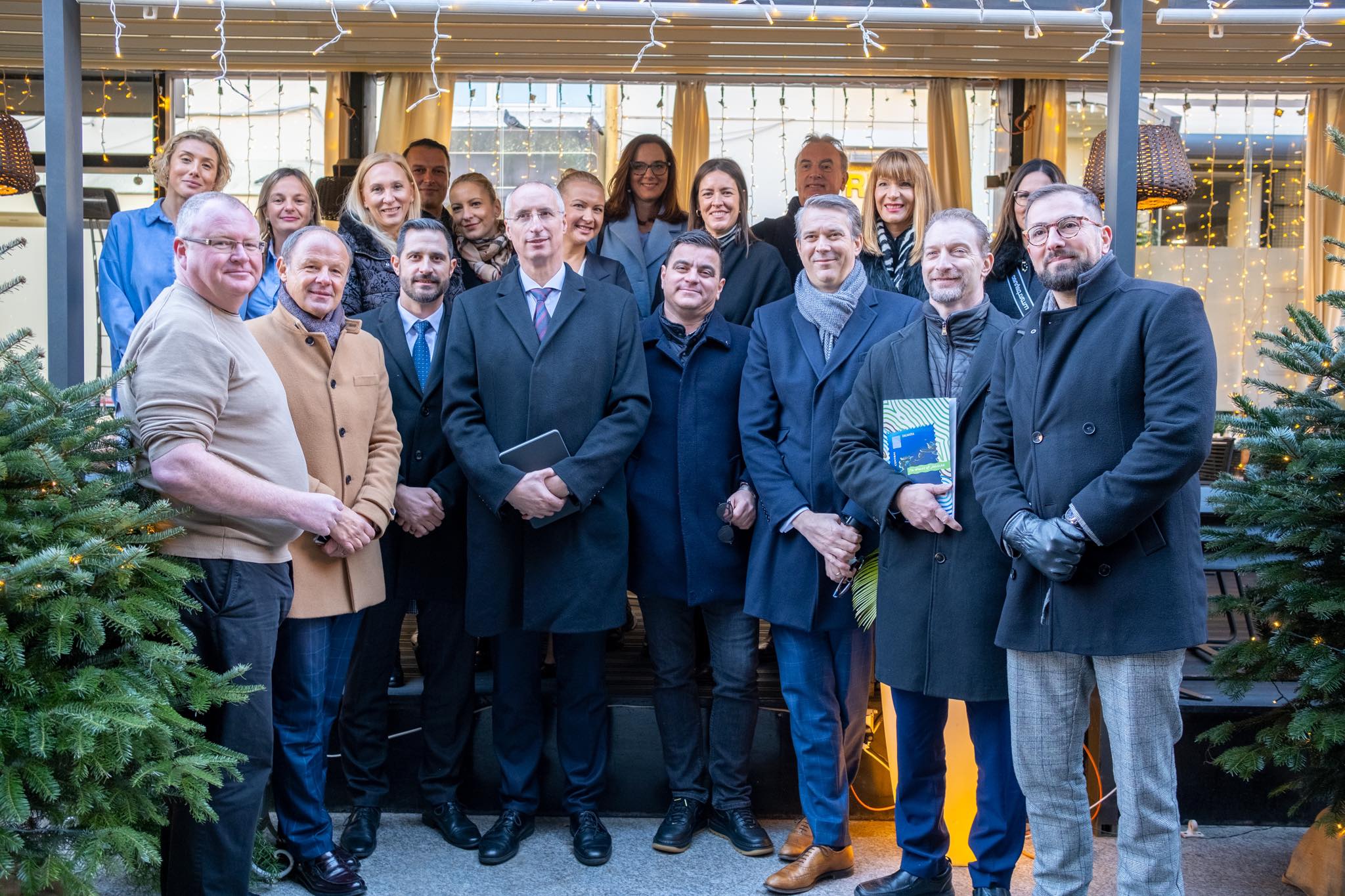
What do we need?
FLIGHTS
*Pero Bilas said the good news is summer, the bad news is winter.
*This can be seen thanks to the figures - capacity fulfilled in the peak season - then it starts spreading into other months - but there is nothing in March if you don’t fulfil April, and so on.
*Need to focus on November tourism, not January tourism.
*Extend flights for the first 12 days of November. Fulfiling November is a way we can continue.
*55 airlines for summer 2022 at the moment, which is comparable to 2019 (dependent on the pandemic). 5 million seats and more than 2 million passengers are expected in the 2022 season.
*No available slots in the summer.
*Airlines slightly extend their schedule into November.
*This week - 55 flights total - load factor 47% - achieving 70% would be great. Example - 55 flights - 5,5000 seats one way (11,000 weekly). During the peak season, we have 120 flights.
*In comparison this week, Dubrovnik has 27 flights, Tivat 34 flights, Zadar 6 flights.
*Can you negotiate with airlines on conditions? In aviation there is only summer/winter - Split Airport cannot make it conditional due to the IATA scheduling and Split Airport policy.
*Split Airport policy on subsidised flights? Can we agree with Ryanair? Split has had several discussions with Ryanair - equal conditions for everyone. Ryanair requests more than anyone else - Split Airport can’t jeopardise other airlines. Ryanair already flies to Split all the time, no need for a base.
*Can there be a call to action for winter slots? Hotels are flexible in the winter, why can’t airports be? Can the airport have similar actions?
*Are landing rights the same in summer and winter? Can we make an incentive for winter time (passenger service drop down of 5 euro)?
*Split Airport pricing - honest figures.
*Ryanair in Zagreb offers special discounts - big question mark on how.
*Split Airport reached Zagreb traffic - 3.3 million passengers in 2019.
*Typical winter month at Split Airport is 30k passengers - that is a single Saturday in the peak season.
*What is at Split Airport’s disposal to attract flights? Subsidies to promote the pre and post-season.
*If two companies want slots in the season - how do you choose? Is it possible to offer a slot in the offseason if all slots are taken in the summer? Answer - everyone wants a summer slot.
*No one will come to Split for a city break if they have to pay 500 euros for a flight.
*New cities - need to think about locals as well - need cities locals want to visit.
*Tonci Glavina - in 2017, the ministry started a subsidy flights program - invested 70 million kuna (10 million euros)
- all charter airlines/land tour operators
- 259 new flights in Croatia
- great success
- 10 million sounds like a lot of money but it is peanuts
- several meetings with tour operators - Ryanair most - they’re in the business to make money
- if they have low capacity, they won’t make money
- Chicken and egg again - motives for arrivals to the destination - what will motivate guests to buy tickets? Ryanair flies to Split for free.
Branding as Dalmatia
*Tonci Glavina on Split winter tourism - to brand Split as a year-round destination, we need to brand Dalmatia.
*All the main tourism products we offer cannot be had by themselves - Split will always be the centre but without Dalmatia it is nothing.
*In order for year-round tourism we need other products
*Private and public sectors need to brand the image better - does Istria have better olive oil or wine? No, but better banding.
*We need to brand Dalmatia a destination and create motives for arrival.
*Flights - first direct flight from the US to Dubrovnik 3 years ago - Ministry invested huge political capital, no subsidies
*American airlines - huge campaign in the States - United and Delta followed
*The government can help Split Airport
*Joško Stella - we have 3 institutions doing the same thing - the season has extended in the last 5 years
*To extend the shoulder season, we need to go stronger into November
*Tourist boards have a big capacity (funds)
*Eurowings, Jet 2, easyjet, etc have the most flights in the most critical months, but everyone wants the same thing - more slots in summer
*What is Split’s advantage? 55 airlines - if someone drops out, we don’t have a problem
*We need to incorporate everything when looking at extending the season. Everyone needs to get involved.
*Tourist Boards will subsidise events - 100k euros last year - especially pre and post-season activities
*Conclusion from Split Tourist Board - we need to all work together - that is extremely important. We have prepared many events - working on ‘Gastronomy Month’ in November.
Next Steps
FUNDING
*Only two people at the meeting had funding so far from Tourist Boards. Suggestion - funding session with Stella, Puljak, and Vukšić to look at branding and budgets.
*Mayor Puljak - we need an even larger strategy - need Split to become an international city - 20-30% of foreigners will make it an international city
*Ideas - Gastronomy month (October or November) - Month of Music - need to target a month that is outside the season (June or May)
*Gastronomy action group - marketing, prices, looking at other examples - Split Tourist Board, City of Split, Split-Dalmatia County all need to work together
*Missing a branding strategy for Dalmatia and Split
*The good news is that we don’t have a brand established yet
Airport strategy
*How will we fill April and October and grow as well? Tourist experts should lead, but the airport will take part (with Split and SD County)
*Who directly works with the airports in the Tourist Boards?
*Need to create the product, not invest in flights
*Split Tourist Board creating dozens of products every year, cooperating in education and events
How can the private sector be more involved on a regular basis to speak the same narrative?
*Through HGK - they are the link - they are a hub to connect
*They act upon a problem
*Need better cooperation
*Meetings are held to put out fires but not to plan
Tonči Glavina - are we reaching the wrong conclusion?
*2 years ago the Ministry introduced a new tourism reform system.
*Tourist Board infrastructure - if it is run properly, it is headed by the mayor, with the Tourism Council headed by the Prefect.
*Members of Tourist Boards in Split and SD County are companies that pay membership fees.
*There is an annual meeting with the council - headed by Mayor or Prefect - to make decisions for the destination.
*Reorganizing the system gave more power to local tourist boards - regional tourist boards received more money.
*Tourism policies are created here/executed here - needs to be done through the local government.
*HGK - part of destination management - needs to be involved as well.
*All synchronization needs to happen through these bodies - leadership needs to be involved
*It is already set up - we just need to do better.
How?
*We have the products, we need to do a better job.
*Hotel Marjan revamp with bring MICE capacity.
*Tonči Glavina is optimistic.
*We do not need to create new products, but make the ones we have better and brand them better.
*Need to talk about extending the shoulder and preseason - not the winter (think about autumn and spring)
Recap - final comments by participants
Joško Stella: Next step will be to meet with the tourist council. We need to consider the entire region and what is best for the region. He will invite cooperation with HGK and other representatives to reveal the details of financial possibilities. We need to inform people about these possibilities.
Ivica Puljak: We have the system set up, but need to make it better. We are all represented already. Puljak is very willing to do it; excited to consume the opportunity. Build the brand of Dalmatia. Split-Dalmatia County is not recognisable.
Tonči Glavina: Split is the heart of Dalmatia - Dalmatia is the brand. 2,000 guests in the County right now, all 2,000 in Split. The government will support activities at the regional and local level - co-financing programs, etc. 2.2 billion kuna in EU funds coming to the Croatian tourism sector by next summer. They need to allocate funds for 2021-2027. They are working on a sustainable tourism strategy for the next 10 years - can help through the system.
Alijana Vukšić: Better cooperation. We have to think together, we have time. We have everyone here, and many chances to work together.
Jelena Tabak: We will continue to cooperate with the city; hopefully the terrace prices go down. Caterers will fight to keep things open in November.
Maria Mustapić: We need to think about a plan and strategy to make Dalmatia more recognisable.
Jasmina Krušić: We will continue working at Chops so that there are excellent offers for locals and tourists. We will work with Jelena and the Tourist Board to create a good plan for November. We need admin help with investments and events - this process is slowing us down.
Zoran Pejović: 200 million euro of investment in Split-Dalmatia County coming. The private sector needs to be the driving force. The government needs to help by lowering taxes. Allow tips to be non-taxable. We will have guests but no employees. We need to commission new research to know how many tourists come by car, plane, how markets see Split. We need global research, then work on a strategy together.
Ivana Durdov: We are lacking products and need to work together to create the product. We have a lack of promotion. We invest a lot in marketing in general but not really promoting our services. We will promote Dalmatia as a brand through our channels (luxury tourism in the American market - travel in the offseason).
Paul Bradbury: We have a world-class offer 12 months a year - but are bad at telling people. Using video content through the eyes of digital nomads year-round is the way. We are developing a platform of authentic experiences all over the country to show there is life everywhere through digital nomads and remote working. Cromads is a great platform to move Croatia forward. I will ask for meetings with Stella, Brnjac, and others.
Ante Lacman: We have the top clients that exist in our sector. I have the clients, I need connectivity and accessibility. We need to join actions in terms of content/targeting which guests and flight companies we want. We have specialists in their own business but we need leadership. We are willing to help but we need Vukšić, Stella, and Puljak. Why can't we bring MICE? We need to look at all destinations, brand as Dalmatia, and work together.
Pero Bilas: We need a short-term plan for November and a long-term plan. We need to brand the products and promote them. We need an incentive scheme. Everyone needs to participate. We will share all of our figures.
Nevena Antonini: We need to brand Dalmatia, but we didn’t say who will do it. Who is the expert? Let's create a tender for a tourism expert.
Arnoud Zaalberg: Branding is just one side but won’t save the winter. What makes and breaks our year is the shoulder season (MICE). I have still not heard about a regional strategy/important project - what is the long-term plan for the Split area? Potentially a convention centre? This will make a real difference and the branding will fall into place. We need to look beyond 4 years. Create a focus group on the long-term strategy. How can we get 5 big hotels? Government projects - how will everyone’s struggles be solved? If the project is right, the road is right, the legal structure is right - we will have the way. Foreign investors are scared of Split, we need to make it easier - we need to set the framework better. How can the government make this easier?
Adrijana Mladina: We all need to agree on where we see Split in 10 years. What do we want from Split? Car launches? Film industry? We need a clear picture of where we want to be.
Natasa Bušić: At the national level we have a tourist council of the chamber which brings together the private and public sector - we can do that for SD county. Bring in the head of each association with public authorities, and perhaps airport, etc. We can meet as often as possible for solutions to problems and create a long-term goal.
Joze Tomaš: The 3rd time we will succeed. We will work on problems. We need a better business environment in Split. Need to think about all sectors.
Proposed Actions based on the above feedback
Everyone
- to meet again at the end of January, in a speed dating style format so individuals get a better chance of sharing specific needs of the sector
- Meeting date TBD - between January 24 to 28, 2022.
Tonči Glavina -
- to provide an overview of the strategy so everyone understands how they can contribute
- to outline the new and improved ways that everyone can get involved in decision making as per restructured system
- to support Ivica, Joško, and Alijana and to ensure inclusion of interested parties at an SDŽ and Split level
Joško Stella
- To take a shared lead on creating an action plan for this year, especially October and November, with private partners sharing responsibility
- To report back to his council, and to invite a representative of the private sector along
- To set up an informational funding session in partnership with attendees, to ensure a large reach
- To improve connections between SDŽ and private organisations to ensure the same message in marketing and to ensure collaboration rather than duplication
- To work with TZ director Alijana Vuksic and meet with the initiative (Udruga Ugostitelja) on possible events for November
Ivica Puljak:
- To take a shared lead on creating an action plan for this year, especially October and November, with private partners sharing responsibility
- to share which private sector representatives currently attend the council and vote on decisions at a county and local level
Alijana Vukšić
- To take a shared lead on creating an action plan for this year, especially October and November, with private partners sharing responsibility
- To improve connections between Split Tourist Office and private organisations to ensure the same message in marketing and to ensure collaboration rather than duplication
- To report back to her council, and to invite a representative of the private sector along
- To work with TZ SD-County director Josko Stella and meet with the initiative (Udruga Ugostitelja) on possible events for November
Jelena Tabak
- To attend future strategic meetings set up by the City and County Tourist offices
- To report back to caterers, and create an action plan and offer for October and November, that will feed into the city and county offer
Maria Mustapić
- To attend future strategic meetings set up by the City and County Tourist offices
- To report back to the hostel industry, and create an action plan and offer for October and November, that will feed into the city and county offer
Jasmina Krušić
- To attend future strategic meetings set up by the City and County Tourist offices
- To report back to the restaurant industry, and create an action plan and offer for October and November, that will feed into the city and county offer
Zoran Pejović
- To partner with Ante Lacman and Arnoud Zaalberg, and gather the private sector attendees and create a list of recommendations and solutions, highlighting areas that need to be changed, including bureaucracy, financial elements, potential investments, MICE and research, and persons responsible, all of which can be presented and discussed next meeting
- To attend future strategic meetings set up by the City and County Tourist offices
Ivana Durdov
- To attend future strategic meetings set up by the City and County Tourist offices
- To report back to DMCs and Tour Agencies, and create an action plan and offer for October and November, that will feed into the city and county offer
Paul Bradbury
- To attend future strategic meetings set up by the City and County Tourist offices
- To maintain continuous communication with other news portals, both local and international, to ensure the branding is clear globally
- To send a Cromads delegate to work with Ivana Durdov
Ante Lacman
- To partner with Zoran Pejovic and Arnoud Zaalberg, and gather the private sector attendees and create a list of recommendations and solutions, highlighting areas that need to be changed, including bureaucracy, financial elements, potential investments, MICE and research, and persons responsible, all of which can be presented and discussed next meeting
- To attend future strategic meetings set up by the City and County Tourist offices
Pero Bilas
- To attend future strategic meetings set up by the City and County Tourist offices
- To provide regular updates to interested parties about slots and flight capacity and opportunities and in turn actions needed to extend the season
Nevena Antonini
- To attend future strategic meetings set up by the City and County Tourist offices
- To continue working closely with large hotel chains in developing their offer and in turn attractiveness all year round
Arnoud Zaalberg
- To partner with Zoran Pejovic and Ante Lacman, and gather the private sector attendees and create a list of recommendations and solutions, highlighting areas that need to be changed, including bureaucracy, financial elements, potential investments, MICE and research, and persons responsible, all of which can be presented and discussed next meeting
- To attend future strategic meetings set up by the City and County Tourist offices
Adrijana Mladina
- To attend future strategic meetings set up by the City and County Tourist offices
- To continue working closely with large hotel chains in developing their offer and in turn attractiveness all year round
Natasa Bušić
- To attend future strategic meetings set up by the City and County Tourist offices
- To share all information about future meetings with all interested parties
- To ensure meetings happen on a timely basis, and provide strategical direction and a platform based on feedback at the meeting (short term plans, long-term strategies)
- To discuss with the private sector in Split and County how HGK can better support them in connecting to the public sector
Joze Tomaš
- To attend future strategic meetings set up by the City and County Tourist offices
- To support Natasa where possible with local initiatives
- To support the private sector with their national solutions, especially around bureaucracy, funding, and attractiveness
Split Roundtable Media Coverage - December 13, 2021
HRT: https://vijesti.hrt.hr/gospodarstvo/ugostitelji-zele-deset-tjedana-dulju-sezonu-3995600?fbclid=IwAR3VrK5Kin-nGWvdP7SKgOK4WO1XF1F0pzrDiJwTt3AQTnAItZILDLSSMyc
Dalmacija Danas: https://www.dalmacijadanas.hr/splitski-ugostitelji-zele-deset-tjedana-dulju-sezonu-spojiti-listopad-s-adventom-jer-svi-restorani-ionako-rade?fbclid=IwAR1pPAFRwDHnUPs6G46r6Wt-rckjqEPt2nDFHhDh8v4XPIK1eVJzweliCso
T.portal: https://www.tportal.hr/biznis/clanak/dalmatinski-ugostitelji-zele-deset-tjedana-dulju-sezonu-najveci-problem-je-manjak-letova-zimi-foto-20211214/print?fbclid=IwAR3vkrY5BT_7mZiDzIxOOOxlUBo4Zh52dl09vf8R-8cFvv38iWSjD9L1Uy0
RTL: https://www.rtl.hr/vijesti-hr/novosti/zanimljivosti/4157908/split/?fbclid=IwAR3hCQkWxlyNtHJCUPfbviX0HffupHydW8pP2VbQ57ozkMMPJKDwhVt7KFo
Standard of Living in Croatia in 2020 One-Third Lower than EU Average
ZAGREB, 16 December, 2021 - The standard of living in Croatia was almost one-third lower than the EU average in 2020, and living standards were lower only in Bulgaria, shows the latest report by Eurostat, released on Wednesday.
Eurostat measures living standards by actual individual consumption per capita (AIC), which consists of the goods and services actually consumed by individuals, irrespective of whether these goods and services are purchased and paid for by Households, by Government or by Non-Profit Institutions Serving Households (NPISH).
AIC is expressed in purchasing power standards, an artificial currency that eliminates differences in prices between countries.
In 2020, the highest standard of living, as expressed by AIC per capita, was recorded by Luxembourg, and it was 45% above the EU average.
Italy, Cyprus and Lithuania closest to average
Luxembourg was followed by Germany and Denmark, whose standard of living was 24% and 22% above the EU average respectively. The Netherlands and Austria were close by, with a standard of living of 17% and 16% above the EU average respectively.
Cyprus, Italy and Lithuania were closest to the EU average according to AIC per capita, with their standard of living being around 4% below the EU average.
Living standards were 10% below the EU average in Ireland and 10% above the EU average in France.
Croatia alongside Bulgaria
Croatia had second lowest AIC per capita as measured by purchasing power standards, of 32% below the EU average, which is more or less in line with Eurostat's forecast from June.
In 2019, Croatia's AIC per capita was 34% below the EU average.
Hungary and Latvia had living standards of 30% below the EU average, while Slovakia had a standard of living of 29% below the EU average.
Bulgaria again fared worst, with AIC per capita of 39% below the EU average.
In terms of price levels, in Croatia they were by one-third lower than the EU average, which puts Croatia alongside Lithuania.
Luxembourg tops GDP per capita ranking
In terms of GDP per capita, expressed as purchasing power standards, Luxembourg was first again, with GDP per capita more than two and a half times higher than the EU average.
The high GDP per capita in Luxembourg is partly due to the country's large share of cross-border workers in total employment. While contributing to GDP, these workers are not taken into consideration as part of the resident population which is used to calculate GDP per capita, Eurostat notes.
France and Malta closest to average
Ireland is second in terms of GDP per capita, which in 2020 was slightly more than twice the EU average. Denmark and the Netherlands follow, with GDP per capita of 35% and 32% higher than the EU average.
Austria, Sweden and Germany were close by, with GDP per capita of close to one-quarter higher than the EU average.
France is slightly above the EU average and Malta slightly below, while Italy and the Czech Republic are close to the EU average, with their GDPs per capita being around 6% lower than the average.
Croatia in the company of Greece
In 2020, Croatia had GDP per capita of 36% below the EU average, two percentage points more than in 2019.
Greece's GDP per capita was 38% below the EU average, and Slovakia and Latvia were close by, with GDP per capita of 30% below the EU average.
Bulgaria is still at the bottom of the EU ranking, with GDP per capita of 45% below the EU average.
Contract Signed for Project Documentation for Vertical Quay in Vukovar Port
ZAGREB, 16 December, 2021 - A contract was signed on Wednesday between the Vukovar Port Authority and the IGH Institute for making project documentation for a vertical waterfront at the Vukovar Port worth €1.67 million.
The project is being co-financed with EU grants, which account for 85% of the funding, while the remainder will come from the state budget. The project should be completed by 31 March 2024.
"When the project is completed, we will have 300 metres of a new vertical waterfront at the Vukovar port. To date, we have signed a contract for project management and today we have signed a contract for project documentation with a consortium of bidders comprising IGH, KPMG Croatia d.o.o. and the Vodoprivredni Projektni Biro from Zagreb", the port's acting director, Iva Horvat, said.
The document should result in the issuance of building permits, after which we will apply for EU funds required for construction, she added.
"The idea is to construct 300 metres of a new vertical waterfront at the Vukovar Port that will be connected to the railway infrastructure by building new industrial tracks, as well as with the road infrastructure by building access roads. A new handling area and warehouses should be built as well," she said, adding that this would enable ships to dock regardless of the River Danube's depth.
IGH management board president Robert Petrosian said that the project is part of a broader development project for the port along the Rheine-Danube corridor.
The head of the inland navigation office at the Ministry of the Sea, Transport and Infrastructure, Duška Kunštek, said that this was a strategic project for Slavonia's development.
Vukovar Port is the only river port in Croatia. It is located on the right bank of the Danube River and enables navigation throughout the year.
The port covers an area of about 19 hectares, with 2.68 hectares used by concessionaires. The four-berth waterfront is 450 metres long. With its current capacity the port handles between 1,200,000 to 1,500,000 tonnes of cargo annually.


